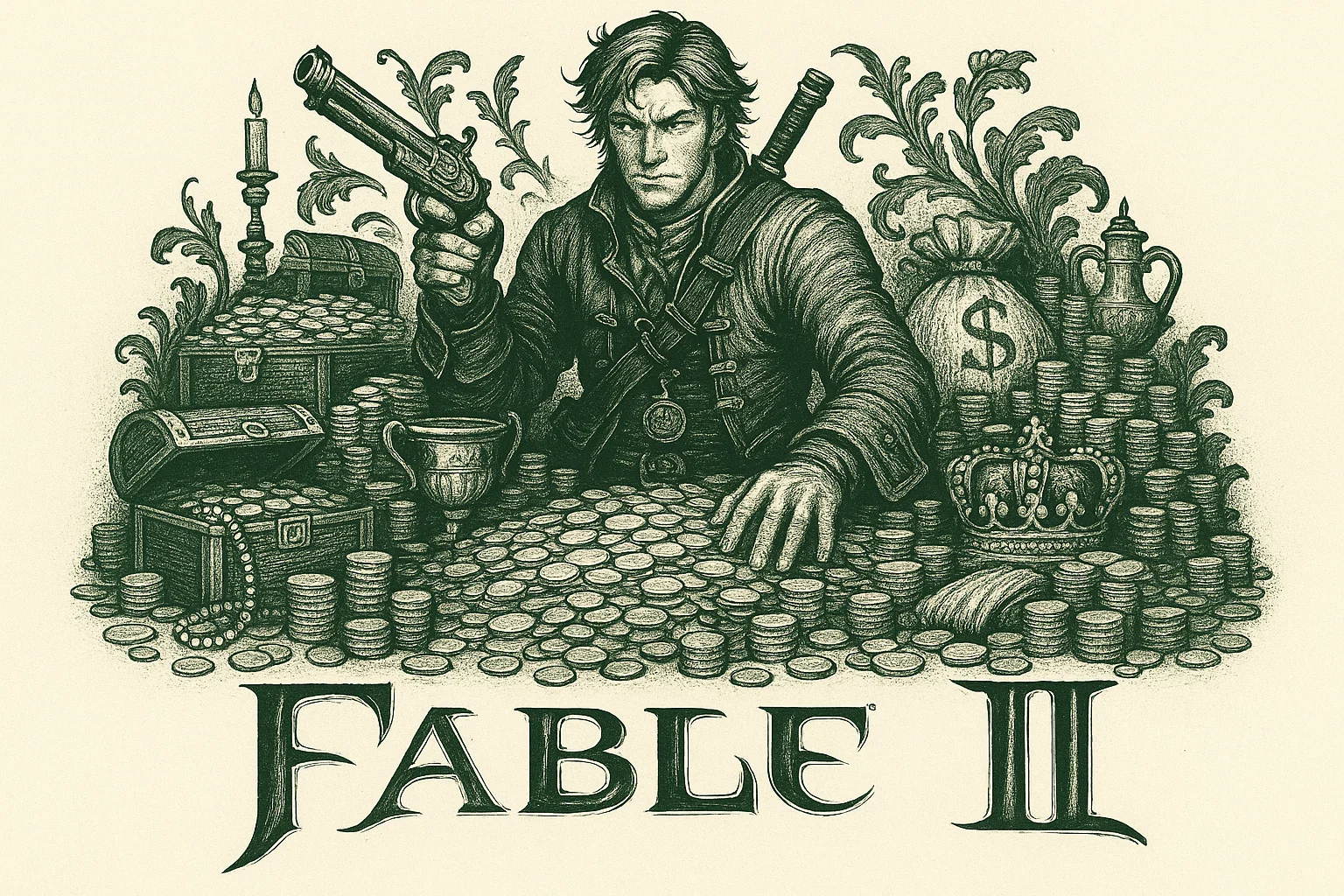Fable II taught me investing lessons long before real life did: buy assets, let money work for you, and build the freedom to play on your terms.
When people talk about learning how to invest, they usually mention classics like The Intelligent Investor, podcasts about index funds, or TikToks on FIRE (Financial Independence, Retire Early).
My first investing lessons and experiences? It didn’t come from any of those, and it was only years later that I actually realized it. It came from the fantasy RPG I played as a teenager and that still is one of my favourite video games to date: Fable II.
Yes, that Fable. The one drenched with British humor and sarcasm, where you spend as much time in the fictional world of Albion kicking chickens and flirting with villagers as actually trying to save it.
But hidden between the troll-fighting and silly side quests, the game had a a great feature. One that occasionally invoked almost the same feelings and thoughts my finances do today, years before I ever opened a brokerage account.
The Day I Became a Virtual Landlord (and Earned My First Passive Income)
The game initially offers you an opportunity to work multiple jobs: blacksmithing, woodcutting, and bartending. Basically, side hustles before they were cool. Initially this was my primary means to afford the weapons and clothing I needed for my epic adventures. But after playing for a while, I noticed something: you could buy properties (houses, shops, market stalls), and collect rent from them. Nothing flashy. Just buy, hold, and wait. I gave it a try and bought the cheapest possible shop: the fruit and vegetable stall on the town square. That expense gave me my first ever passive rental income, in pixels. And a first taste of long term investing.
Suddenly, new opportunities arose on which my disposable in-game income could be spent. After some more blacksmithing and using the rent of my market stall I could quickly buy another, and then another. And even if I was out on my quests to save the world, money still flowed directly into my pocket because I collected rent. Before long, I owned the biggest castle in the game. Not because I was the strongest fighter (I eventually became that as well because I could now afford all strength-boosting potions), but because I had figured out cash flow.
The real kicker? Even when I turned the Xbox off and came back the next day, my character had earned gold while I was sleeping. That concept absolutely blew my mind.
The Investing Lessons Hiding in Fable II
Looking back, Fable II taught me lessons that apply far beyond the world of Albion:
1. Buy assets, not toys.
Financial freedom doesn’t come from buying the shiny sword, it comes from owning the blacksmith that sells it to every other wannabe hero.
2. Money works while you don’t.
Rent rolled in whether I played or not. That’s passive income, in pixels. And if the economy grows, the value of your assets rises as well.
3. Time amplifies everything.
The sooner I bought, the more I earned over the long run. That’s compound growth, gamified. It was only after my first playthrough that I truly realized this. Whenever I replay the game today, the first thing I always do is get enough cash to make my first investments as early as possible.
4. Cash flow = freedom.
At some point, I didn’t need quests for gold anymore. I did them for fun. The money side had taken care of itself, I was financially independent. And the earlier I started investing, the sooner that point arrived.
When the Pixels Turned into Euros
Years later, when I could put away money for the long term and started my first investments in ETFs , something clicked. I’d seen and felt this before. Because, just like in Fable, time is the real multiplier. Only this time it wasn’t gold coins; it was real money.
And the lesson was the same: freedom doesn’t come from buying cooler swords (or, in real life: cars, fashion, and other stuff), it comes from owning the blacksmith. From building something that pays you, even when your mum cuts off the power to the Xbox because you’ve been playing for hours on end.
Final Thought: From Video Game to Financial Freedom
Fable II didn’t make me rich. But it planted a seed that made the idea of investing feel natural, even obvious. And even more impressive, the feeling of amassing a large amount of gold in-game was actually quite similar to the feeling I experienced when making my first 100k in the real world.
So the next time someone tells you video games are a waste of time, just smile and tell them your Xbox taught you more about return on investment than high school economics ever did.
What’s the earliest lesson (from a game, story, or real life) that shaped the way you think about money today?
Many readers share these lessons in their own circles. If this story gave you something, feel free to pass it on!

Leave a Reply